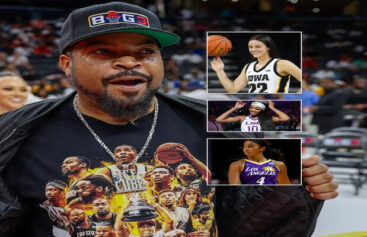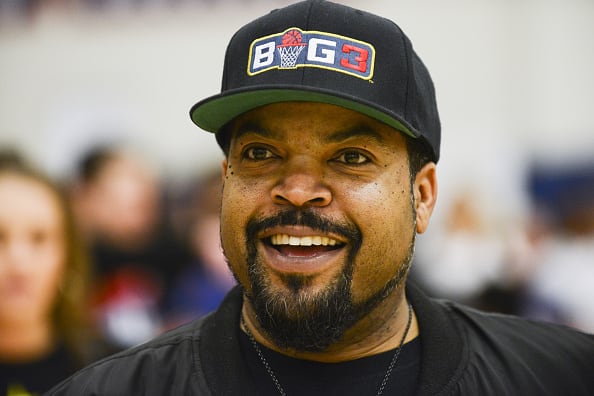Everyone looks forward to Friday for their own reasons. Its the end of the work week, its a great night to go out and its a great day to take off to start a long three day weekend. For Craig Jones, Friday seems to be the longest, most event filled day in history and 20 years later Friday is still a long-running movie that we look forward to watching.
While Friday wasnt a guaranteed success, it was a risk worth taking based upon the previous five years in black culture.
From 1989 1994, urban culture was experiencing a renaissance period, one in which sports, music and film featured a takeover of black culture that had not been witnessed for decades. Larry Johnson and UNLV were intimidating teams on the hardwood, the Fab Five ushered in urban lifestyle into college basketball and Arkansas gave us 48 minutes of hell. The West Coast was continuing to exert its strength through gangsta rap, Native Tongues and conscious rap was beginning to flourish on the East Coast, Teddy Riley and the New Jack Swing movement were moving up the charts and neo-soul was traveling from England to give us a new sound to experience.
In 1989 we saw a new wave of the harsh realities of urban life being depicted on the silver screen, highlighting issues such as racism, education and crime. Spike Lee showed us the racial tensions boiling in the streets of urban America with Do The Right Thing, while Morgan Freeman depicted the hard-nosed but deeply caring Principal Crazy Joe Clark in Lean On Me. The manifestation of black life and the issues plaguing urban America in film continued over the next four years, giving us hood classics such as King of New York, Marked for Death, House Party, Boyz n the Hood, New Jack City, Juice and Menace to Society. Added to mix were the classic Eddie Murphy films Another 48 Hours and Boomerang and Spike Lees Malcolm X, a film that saw Denzel Washington being robbed of an Oscar for his realistic transformation into the man himself.
While these were great movies that held great significance for many reasons, it was also a tough time for Black audiences as they were forced to watch what many witnessed and experienced every day in the cities we lived in. Nino Brown running the drug trade, Ricky becoming another innocent casualty of senseless gang violence, Q trying to balance street life with dreams of becoming a successful DJ, Caine getting caught up in the wave of ignorant thug life. It was difficult to watch characters that we witnessed in our daily lives repeating the same mistakes portrayed by these characters. But through these films came a demand for different black films, films that combined humor, realism, unique characters and more identifiable black characters that a larger part Black America could support without hesitation or apology. Marcus Graham was the black executive that was the anti-Nino Brown that succeeded without drugs. Malcolm X inspired millions and a supported a movement. Urban America was starting to demand new characters, new movie plots and another perspective.
In April of 1995, that call was answered by five Black men.
We discussed the significance of Will Smith, Martin Lawrence and Bad Boys, which recently celebrated its 20th anniversary on April 7th. Nineteen days later, black film took another step forward and away from drugs and gang life, when Ice Cube, DJ Pooh and F. Gary Gray teamed up to create Friday.
Friday, the first installment in the series trilogy, took us through an entire Friday in the lives of Craig (Ice Cube) and Smokey, played by Chris Tucker who was making his big screen debut. Not having jobs, these men go through an eventful day in which they lounged around, avoided being shot, hung around with girls, watched drama unfold from the front porch and faced off against the neighborhood bully in the movies climax. It seems like a lot of action for one day, and yet it never felt unrealistic to us as the audience. This was part of the movies success, that it felt realistic while simultaneously entertaining. Utilizing the comedy element of Reginald Hudlins successful House Party franchise, while adding in a little Boyz n the Hood, Gray, Cube and Pooh were able to create characters that audiences loved, followed and quoted, ones that still hold cultural significance twenty years later.
While Smokey provided the laughs, it was Craigs cavalier and often confused demeanor that made him more tangible and drew the audience closer to him, some of the reasons why the Friday series was able to last so long. He was serious yet likable, and you couldnt help but support him as he was trying to get things together on such an eventful day. From trying to avoid trouble while being a friend to Smokey, to following his journey along the colliding paths of pursuing Debbie (Nia Long) and standing up to neighborhood bully Deebo (Tommy Tiny Lister), Craig just couldnt seem to find a way to balance everything properly. He has nothing to do with Smokeys relationship with the drug dealing, ice cream truck driving Big Worm (Faizon Love), yet he is dragged into it because Smokey owes him money and Craig is Smokeys friend. It was his loyalty to those he cared about that made Craig such an identifiable character and what ultimately brought him into the street fight with Deebo.
We know the great characters from the film, especially Craigs father Mr. Jones, played by John Witherspoon, and they all brought something special to the movie that enabled them to live on in future installments. But the two most interesting elements of the movie were two points of discussion that were being played out in real life, both of which had serious implications and outcomes.
When Friday was released, the ignorantly concocted East Coast vs. West Coast beef was beginning to boil, erupting a few months later at the infamous Source Awards when Suge Knight went at Diddy on stage, leading to fights, shots being fired and hip-hop suffering a black eye for no other reasons than greed, insecurity and over-inflated egos. But while this beef was percolating, Friday, based in the West Coast, stayed far away from this issue, instead focusing on making a good movie as opposed to one that took digs at personalities or coasts. F. Gary Gray was from New York and Cube and Pooh were from the West Coast, yet that did not prevent them from partnering to create a classic movie, one that opened the door even more for black actors, writers, producers and directors. This included entertainers who began to make the transition from careers in music and comedy to careers in film. This list is comprised of Cube, who made his directorial debut three years later with The Players Club, Master P, who made I Got The Hook Up that same year, Tucker, who went on to star in Dead Presidents, Money Talks and the widely successful Rush Hour series and the late, great Bernie Mac (Pastor Clever), whose comedy genius made him a King of comedy and landed him his own successful television series.
All successful Black men who gave back to their families, friends and communities, men which opened doors and became role models for all.
The second element of the movie that held great importance was the way in which it addressed stereotypes of black families and violence. Craig came from a two parent home with a strong sense of family; we would see this in the next two films as his mother, played by Anna Maria Horsford, Father (Witherspoon), Uncle Elroy (Don D.C. Curry) and Cousin Day-Day (Mike Epps) all remained in the storyline and were all a part of Craigs life. We also saw the love that Craigs father had for his son; showing him that a man stands up for whats right and fights with his fists and not guns, that he’s a man without a gun. Sending him to live with his uncle to get him out of the hood, dropping everything immediately when he hears that his son is in trouble, and supporting him when he needs help. While the actions and images are overt for all to see on the screen, the message is subliminal yet extremely important, especially for Black fathers who are often accused of being bad parents or who abandon their children.
So as we celebrate Friday for turning 20 and for continuing to make us laugh, we should also look at the movie for what it showed us, what it emphasized, avoided and created. It entertained and educated. It displayed and yet didnt reside upon. It stood alone and carved a path.
Its ironic that Ice Cube said Ice Cube is not for the pop charts because OShea Ice Cube Jackson has been a part of pop culture for almost 30 years now, and the only thing better than spending a Friday with him would be spending four Fridays with him.



